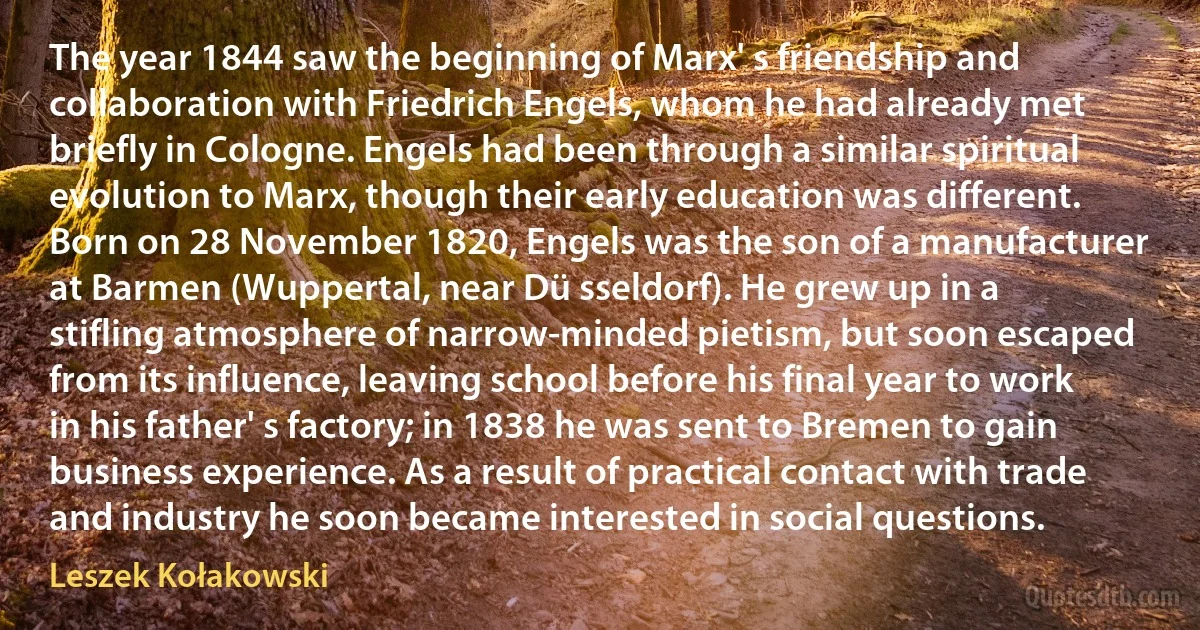
The year 1844 saw the beginning of Marx' s friendship and collaboration with Friedrich Engels, whom he had already met briefly in Cologne. Engels had been through a similar spiritual evolution to Marx, though their early education was different. Born on 28 November 1820, Engels was the son of a manufacturer at Barmen (Wuppertal, near Dü sseldorf). He grew up in a stifling atmosphere of narrow-minded pietism, but soon escaped from its influence, leaving school before his final year to work in his father' s factory; in 1838 he was sent to Bremen to gain business experience. As a result of practical contact with trade and industry he soon became interested in social questions.
Leszek KołakowskiRelated topics
atmosphere born beginning business cologne different early education evolution experience father final friendship gain industry leaving manufacturer met near result saw school sent son stifling trade work year marx engels questionsRelated quotes
Some recent scholars have proposed that Jesus ... preached a "radically egalitarian society"-that is, that he set about to reform society by inventing a new set of rules to govern social relations ... There is little to suggest that Jesus was concerned with pushing social "reform" in any fundamental way in this evil age. In his view, present-day society and all its conventions were soon to come to a screeching halt, when the Son of Man arrived from heaven in judgment on the earth. Far from transforming society from within, Jesus was preparing people for the destruction of society. Only when God's Kingdom arrived would an entirely new order appear, in which peace, equality, and justice would reign supreme.

Bart D. Ehrman
When we met in Berlin [1910], I arranged with Heckel and Kirchner that the three of us would go and work together on the lakes of Moritzburg near Dresden. We had long been familiar with the region, and we knew that we would have the opportunity tp paint nudes in the open air without interference... We had to find two or three people who were not professional models and would therefore pose for us without falling into studio routines.... we artists set out early every morning, laden with our equipment, followed by the models with bags full of good things toe at and drink. We lived in complete harmony, we worked and went swimming.... each of us [three] executed a great number of paintings and drawings.

Max Pechstein
I notice in Kentucky a disposition to cry against the tyranny and oppression of our Government. Now, were it not for war you know tyranny could not exist in our Government; therefore any acts of late partaking of that aspect are the result of war; and who made this war? Already we find ourselves drifting toward new issues, and are beginning to forget the strong facts of the beginning. You know and I know that long before the North, or the Federal Government, dreamed of war the South had seized the U. S. arsenals, forts, mints, and custom-houses, and had made prisoners of war of the garrisons sent at their urgent demand to protect them 'against Indians, Mexicans, and negroes.

William Tecumseh Sherman
When I see a disposition amongst you to trade in humanity, I will not question your motives, I will not deny that it is really felt; but this I tell you, that if you would give force and grace to your professions of humanity, it must not be confined to the negro at the Antipodes, nor to the building of churches, nor the extension of the Church Establishment, nor to occasional visits to factories to talk sentiment over factory children-you must untax the people's bread. Whilst you retain that law, which raises rents but does not raise wages, you may be humane, kind and beneficent, but your benevolence and humanity, more showy than substantial, will soon become a mockery and a bye-word.

Richard Cobden
As you all know, ever since the end of the war Britain has been working against time. We must find a way to stand on our own feet, and that very soon. Since the end of the war, too, our reserves have been small. This means that any alteration in world trade conditions, any failure to produce and sell enough goods must land us in serious trouble... I would like every one of you, whether employer or employed, to start right away to consider how in your particular job you can increase and cheapen production, how you can check absenteeism and get the kind of public opinion in factory, mine, railway, or other workplace which will bring the person who is slacking up to the mark.

Clement Attlee
